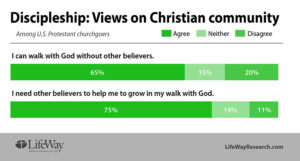Do most churchgoers think they need other Christians?
NASHVILLE, Tenn.—Protestant churchgoers say they can walk with God just fine by themselves, but they also say they need other believers to help them do it.
A LifeWay Research survey sponsored by the Center for Church Revitalization at Southwestern Baptist Theological Seminary finds majorities of those who attend U.S. Protestant or non-denominational churches at least monthly agree with the two sentiments that are seemingly in conflict.
Three in four Protestant churchgoers (75 percent) say they need other believers to help them to grow in their walk with God, with 38 percent strongly agreeing.
About one in 10 disagree (11 percent), while 14 percent neither agree nor disagree.
Despite that, about two-thirds (65 percent) of Protestant churchgoers say they can walk with God without other believers, with 36 percent agreeing strongly. One in five (20 percent) disagree, and 15 percent aren’t sure.
‘A discipleship issue’
Kenneth Priest, interim director of the Center for Church Revitalization at Southwestern Seminary, sees those two statements as contradictory, and he believes churches need to help those in the pew recognize the conflict.
 “I believe this is primarily a discipleship issue,” Priest said. One factor he said has led to a “spiritual apathy” in the pews is “the lack of pastors and spiritual leaders equipped to effectively preach and teach a text-driven life application of God’s word.”
“I believe this is primarily a discipleship issue,” Priest said. One factor he said has led to a “spiritual apathy” in the pews is “the lack of pastors and spiritual leaders equipped to effectively preach and teach a text-driven life application of God’s word.”
This lack of discipleship, Priest said, has caused many churchgoers to be confused or even to see the church as irrelevant to meet their spiritual needs.
“The ‘needing, yet not needing’ responses demonstrate an internal turmoil of individuals desiring community, but not seeing the church as the place to have those needs met,” he said.
Who acknowledges they need other Christians?
Some specific groups of churchgoers are more likely to say they need other believers to help them grow in their walk with God.
Those attending church in the South (41 percent) are more likely to strongly agree than those attending in the Midwest (35 percent) or the Northeast (33 percent).
Younger churchgoers, those ages 18 to 34 (41 percent) and those 35 to 49 (40 percent), are more likely to strongly agree than churchgoers 65 and older (34 percent).
Evangelical Protestants (42 percent) and black Protestants (37 percent) are more likely to strongly agree than mainline Protestants (28 percent).
‘Value and depend on each other’
“Seeing the value other believers can add comes easily for many churchgoers,” said Scott McConnell, executive director of LifeWay Research. “But less than half of them also acknowledge their dependence on other believers. The biblical metaphor of the body illustrates that believers should both value and depend on each other.”
Other believers see their faith as more of a solo act.
Women (38 percent) are more likely to strongly agree than men (33 percent) that they can walk with God without other believers.
African Americans (50 percent) are most likely to strongly agree.
Christians who believe they can walk with God without others are missing out on something essential to their growth as a disciple of Jesus, Priest asserted.
‘Solo Christianity’ or ‘biblical community’
“Solo Christianity is an inward desire to seek after spiritual matters without the realization biblical community is what will fulfill the desire they are seeking,” he said.
Perhaps the American emphasis on self-reliance and individualism has an impact, McConnell suggested.
“Americans don’t like to admit they can’t do things themselves. That is true of Christians as well,” McConnell said. “One’s walk with God should include dependence on God and mutual dependence among believers.”
The online survey of 2,500 Protestant churchgoers was conducted Jan. 14–29, 2019. Respondents were screened to include those who identified as Protestant or non-denominational and attend religious services at least once a month. Analysts used quotas and slight weights to balance gender, age, region, ethnicity, income and denominational affiliation.
The completed sample is 2,500 surveys, providing 95 percent confidence that the sampling error does not exceed plus or minus 2 percent. Margins of error are higher in sub-groups.